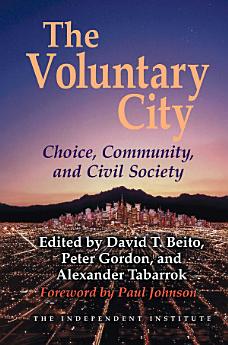The Voluntary City: Choice, Community, and Civil Society
Oct 2009 · Independent Institute
Ebook
480
Pages
family_home
Eligible
info
reportRatings and reviews aren’t verified Learn More
About this ebook
Assembling a rich history and analysis of large-scale, private and voluntary, community-based provision of social services, urban infrastructure, and community governance, this book provides suggestions on how to restore the vitality of city life.
Historically, the city was considered a center of commerce, knowledge and culture, a haven for safety and a place of opportunity. Today, however, cities are widely viewed as centers for crime, homelessness, poverty, unemployment, traffic, pollution, and other social ills. In many cities, government increasingly dominates life, consuming vast resources to cater to special interest groups. Decision-making has become intensely politicized, bureaucratic, and largely unaccountable to the populace.
The Voluntary City provides a rich history and analysis of private, locally based provision of social services, urban infrastructure, and community governance. Such systems have offered superior education, transportation, housing, crime control, recreation, health care, and employment by being more effective, innovative, and responsive than those provided through special interest politics and bureaucracy.
The Voluntary City reveals how the process of providing local public goods through the dynamism of freely competitive, market-based entrepreneurship is unmatched in renewing communities and strengthening the bonds of civil society.
A refreshing challenge to the orthodoxy that government alone can improve community life, The Voluntary City will be an essential reference for anyone interested in the future of cities, including scholars and students, policy-makers, civic and business leaders, and urban citizens.
Historically, the city was considered a center of commerce, knowledge and culture, a haven for safety and a place of opportunity. Today, however, cities are widely viewed as centers for crime, homelessness, poverty, unemployment, traffic, pollution, and other social ills. In many cities, government increasingly dominates life, consuming vast resources to cater to special interest groups. Decision-making has become intensely politicized, bureaucratic, and largely unaccountable to the populace.
The Voluntary City provides a rich history and analysis of private, locally based provision of social services, urban infrastructure, and community governance. Such systems have offered superior education, transportation, housing, crime control, recreation, health care, and employment by being more effective, innovative, and responsive than those provided through special interest politics and bureaucracy.
The Voluntary City reveals how the process of providing local public goods through the dynamism of freely competitive, market-based entrepreneurship is unmatched in renewing communities and strengthening the bonds of civil society.
A refreshing challenge to the orthodoxy that government alone can improve community life, The Voluntary City will be an essential reference for anyone interested in the future of cities, including scholars and students, policy-makers, civic and business leaders, and urban citizens.
About the author
David T. Beito is a research fellow at the Independent Institute and professor emeritus at the University of Alabama. He received his PhD in history at the University of Wisconsin and is the author of T.R.M. Howard: Doctor, Entrepreneur, and Civil Rights Pioneer (with Linda Royster Beito) and From Mutual Aid to the Welfare State: Fraternal Societies and Social Services, 1890-1967. He is also co-editor of The Voluntary City: Choice, Community and Civil Society and the forthcoming Rose Lane Says: Thoughts on Liberty and Equality, 1942-1945.
Peter Gordon is a Research Fellow at the Independent Institute and Professor of Policy, Planning and Development at the University of Southern California (USC). He is also attached to USC’s Center for Risk and Economic Analysis of Terrorist Events.
Alexander Tabarrok is Senior Fellow and former Research Director at the Independent Institute, Assistant Editor of The Independent Review, Bartley J. Madden Chair in Economics at the Mercatus Center, Co-founder of Marginal Revolution University, and Director of the Center for Study of Public Choice and Associate Professor of Economics at George Mason University. He received his Ph.D. in economics from George Mason University, and he has taught at the University of Virginia and Ball State University.
Peter Gordon is a Research Fellow at the Independent Institute and Professor of Policy, Planning and Development at the University of Southern California (USC). He is also attached to USC’s Center for Risk and Economic Analysis of Terrorist Events.
Alexander Tabarrok is Senior Fellow and former Research Director at the Independent Institute, Assistant Editor of The Independent Review, Bartley J. Madden Chair in Economics at the Mercatus Center, Co-founder of Marginal Revolution University, and Director of the Center for Study of Public Choice and Associate Professor of Economics at George Mason University. He received his Ph.D. in economics from George Mason University, and he has taught at the University of Virginia and Ball State University.
Rate this ebook
Tell us what you think.
Reading information
Smartphones and tablets
Install the Google Play Books app for Android and iPad/iPhone. It syncs automatically with your account and allows you to read online or offline wherever you are.
Laptops and computers
You can listen to audiobooks purchased on Google Play using your computer's web browser.
eReaders and other devices
To read on e-ink devices like Kobo eReaders, you'll need to download a file and transfer it to your device. Follow the detailed Help Center instructions to transfer the files to supported eReaders.





